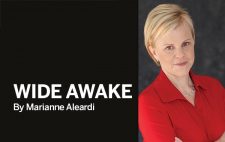Presented by

Not enough people talk about money, at least that’s the belief of the 10 financial experts we gathered for our most recent roundtable. To help start the conversation, we spent the night reviewing everything you should know about your personal finances. It isn’t an easy topic to discuss – some say it has too many emotional aspects. Others view it as strictly mathematical. But whatever your perspective, you know it’s a subject everyone has an interest in, because everyone has money. The problem is a lot of people have no idea what to do with it.
Jill Ross
SVP/Chief Retail Officer,
William Penn Bank
Ken Stephon
President/CEO,
William Penn Bank
Marie Ost
VP/Relationship Manager,
William Penn Bank
Stan Molotsky
President/CEO,
The SHM Financial Group
Albert Fox
Executive Director,
Fox, Penberthy & Dehn Morgan Stanley
Ted Massaro
Principal,
M Financial Planning Services
Chris Warren
SVP/Team Leader,
Investors Bank
Rob Curley
South Jersey Market President,
TD Bank
Joe Tredinnick
Market President,
Republic Bank
Shweta Srinivasan, PhD
Assistant Professor of Finance,
Rutgers University-Camden
On credit cards…
We go into high schools to teach about credit cards. We talk about, ok, if you put a pizza on a credit card, how much is that pizza actually costing you?
Jill Ross
There were no credit cards in this country until around 1965, and it was a privilege to have one. They didn’t just give you four in the mail every day. I never saw my parents pay for anything with a credit card my entire childhood. My father pulled out his wallet and paid cash. I grew up with that concept.
Ken Stephon
Today, kids get offered credit cards in college. They have no appreciation for the fact that they have to pay it back at 21% interest. It becomes a challenge for the rest of their lives, because they learn to enjoy spending money they don’t really have.
Rob Curley
On surviving the stock market…
There is a tremendous amount of complacency because of what’s been going on up until now. At some point there’s going to be a shock of some kind. We don’t know when, but you have to be prepared.
Stan Molotsky
Do you check the price of your house every day? No, but you might check the value of your portfolio every day. You shouldn’t. If it’s something you’ve built over a long period of time, it’s supposed to go up and down. Part of education and part of human behavior is managing your emotions when it comes to that decision-making.
Albert Fox
 What’s challenging about their jobs…
What’s challenging about their jobs…
Years ago in banking, if the customer didn’t meet all the metrics to make a loan but they were good people who had a history of paying the bank back, you could make an exception. That’s pretty much nonexistent now. You have to live and die by the metrics. Credit, character and history don’t matter as much. That’s very frustrating, because there are times when you have a borrower you know is going to pay you back, but you might not be able to make that loan because of a regulation.
Rob Curley
My challenge is overcoming people’s fears, whether it is customers who have fears about banking or employees who have fears about the work environment changing. How do you balance knowledge and fear, and still move forward in an optimistic, strategic, enthusiastic way?
Jill Ross
On how much money you’ll need in retirement…
Many people believe when they retire, they’re going to be spending a lot less money than what they spend now. If you’re living a healthy, positive retirement, you’re probably going to spend more than you spend now.
Marie Ost
The latest estimate is a couple retiring at 65 will spend about $300,000-$400,000 in healthcare expenses over a 30-year period. And that’s if they’re healthy.
Ted Massaro
You need 120% of what you have earned before you retire, because costs keep going up and you’ll have no income coming in.
Stan Molotsky
A newborn today has the life expectancy of 105. There’s a high probability you’re going to live 30-35 years, or maybe more, after you retire. Our oldest client just turned 101. Who’s to say what the magic number is? You start with a base, but then you have to look at it every year and keep refining it.
Ted Massaro
 Your money and technology…
Your money and technology…
A lot of technology is attempting to replace humans. What people fail to realize is the importance of human-to-human contact. A little bit of technology makes things more efficient. A lot of technology creates greater levels of risk than I think most people truly understand.
Albert Fox
When I’m ready to create a real plan for how to protect myself and my assets for the rest of my life, I’m going to talk to a professional human being who can give me real advice.
Rob Curley
On talking to your kids about money…
I was having a conversation with my 6-year-old and I said, “You know what, you can’t just go to Target and buy something because you are there. We don’t spend money on things we don’t need.” It’s important to have that conversation early on.
Shweta Srinivasan
I’ve been having the conversation about how money grows with my son. I said, “If you put this money in the bank, it makes interest and it grows without you doing anything.” He was like, “Yeah, put it in the bank, put it in the bank!”
Jill Ross
Today, younger people – say under 30 – don’t balance their checkbooks. They live and die by their debit cards. They don’t carry cash. Parents will call me and say, “Hey, my son just bought a cup of coffee at Wawa, he only had a dollar in his account, so you guys charged him $35.” Parents want us to reverse the charge when really, they should tell their kids if they don’t have money in the bank, they shouldn’t use their debit card.
Rob Curley
I watched my father pay the bills on Sunday mornings. That was my financial education at home. My 22-year-old son still talks about his finance class from high school, because they taught him how to write a check, balance a checkbook and complete an application for a mortgage. Those are basic life skills that go a long way.
Joe Tredinnick
One piece of financial advice for everyone…
Live within your means. That’s a very un-American way to do things, but you’ll always be net positive that way.
Ken Stephon
Diversify. Don’t keep all your money in cash, don’t put all your savings in the stock market, and don’t invest all your money in your kids’ college education. Spread it out so if something goes bad, you have something to fall back on.
Shweta Srinivasan
Retirement’s important, but so are people in this community who are less fortunate. When you have the means, offer support through charitable giving.
Chris Warren
Remember, we’re only here once. Sometimes spending is okay.
Marie Ost
Have written, well-defined goals for everything you want to accomplish. Measure your progress. Be willing to fail, because if you’re not willing to fail you’re probably not committed to the goal. I have 10 business and personal goals written on a piece of paper I carry with me. I use it to remind myself why I get up every day, what’s important and what I’m working on.
Albert Fox
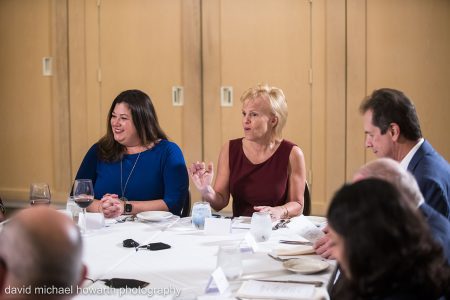
On how people think about money…
Millennials grew up after 9/11. They also lived through the 2007-2009 meltdown. They saw their parents lose their house or lose their job. Their perspective is dramatically different than the baby boomer generation who grew up in the late ’60s/early ’70s. They had a very good period for about 30 years, where things were good overall, so that mindset stays with them. Each generation has a different thought process about money.
Ted Massaro
Twenty years ago people paid their mortgage first, because they wanted to protect their house. They paid their car loans second, because they needed their car to get to work. They paid their credit cards last, because it was discretionary income. Today, people pay credit cards first for the liquidity – so they can use them again. They pay their car second, because they still need their car to get to work. And they pay their house last, because they know it’s going to take forever to go through the foreclosure process, plus they know a lot of people who have gone through it and they’re fine. People have completely reversed what’s important to them.
Rob Curley
It’s all generational. It’s what people have seen their parents or their grandparents give up. Are they going to be like them, and not take the vacation and pass away without spending their money? No, they want to take the vacation. They want to live in the moment.
Jill Ross
There are probably more people than we’d like to acknowledge who are 3 to 6 months away from being in foreclosure. And they’re people who have a nice home, drive a nice car, live a decent life. But if hard times show up at their door, it’s a very short window of time before they have a big problem.
Albert Fox
When you save too much…
I am the caregiver for my 89-year-old mother-in-law. Her accountant coined a phrase I’d never heard before. He said, “You don’t want to be the richest lady in the cemetery.” She’s someone who is afraid she’ll run out of money and not have enough to take care of a health problem she may have in five years. And she feels it’s her obligation to leave money to her children, even though my wife and I tell her we don’t want her money.
Chris Warren
Some clients grew up with parents who lived through the Depression, so they save everything. They could never spend what they have and unfortunately for them, their kids and grandchildren will have a great life, but they can’t enjoy theirs.
Stan Molotsky
People live longer today, so their biggest fear is not having enough money to cover healthcare, so they often save more than they should.
Rob Curley
Should you store your credit card number online…
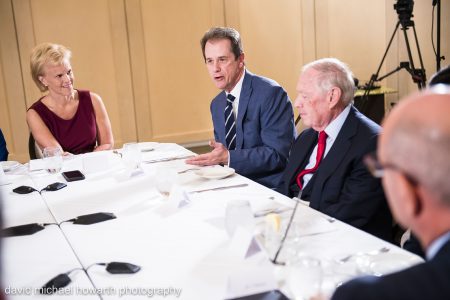 Definitely don’t store your debit card on any site – never.
Definitely don’t store your debit card on any site – never.
Joe Tredinnick
I like convenience, so I have an Amazon credit card with a very small limit on my Amazon account. If I want to buy something quickly, it’s there. But I do not store my primary credit card.
Rob Curley
Never store any numbers anywhere.
Ted Massaro
I have found a system that works for me: I memorized my credit card number, the CVV code and the expiration. If I’m trying to purchase something online, I don’t have to get up and get my credit card, I just enter it.
Shweta Srinivasan
On paying for your kids’ college…
Look at what kind of income you expect your child to earn in the first year after graduation. That’s the maximum amount of debt you should take on.
Stan Molotsky
Every one of my kids had some student debt when they graduated. They didn’t have a lot, but they had some. I wanted them to feel like they owned part of this responsibility. Have I helped pay off some of that debt after they got successful? Yeah, absolutely. But it was theirs when they graduated. It’s a personal preference.
Ted Massaro
Since the government took over student lending about 10 years ago, it’s very easy to get a student loan. When banks managed student lending, you had to qualify for that loan. Today if you have a pulse, you can get a student loan. I worry about families who are borrowing money they’ll never be able to repay.
Rob Curley
If people still go to bank branches…
Transactions can be done online, but the conversations about different stages you’re going through financially, those are conversations you have at a branch with someone you trust.
Jill Ross
There is a certain demographic that visits branches, but that demographic is disappearing. I don’t think my daughter sees any reason to go into a bank branch. In fact, you could say she sees it almost as an inconvenience.
Chris Warren
People come to a branch to ask for advice, so the reason why they come in has been altered, but they are still coming in.
Marie Ost


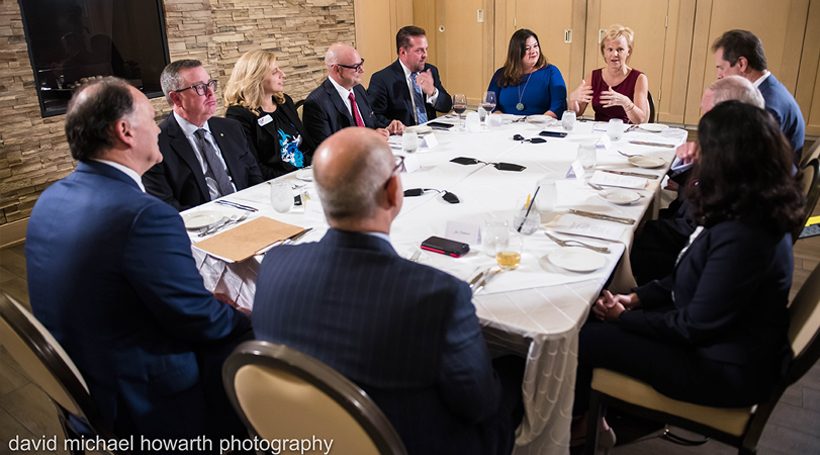
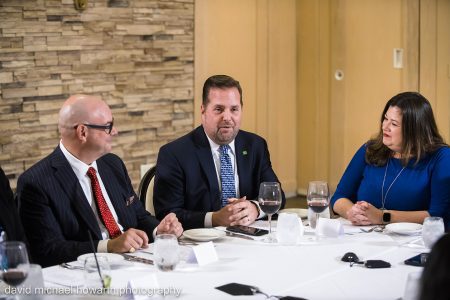 What’s challenging about their jobs…
What’s challenging about their jobs… Your money and technology…
Your money and technology…


